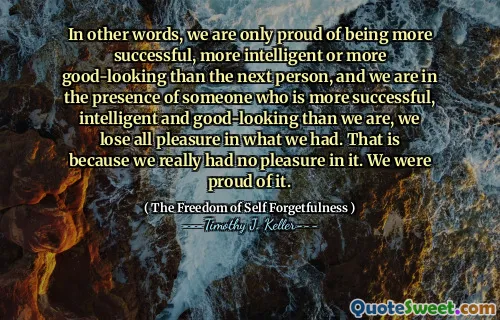
He sees all kinds of sins in himself – and all kinds of accomplishments too – but he refuses to connect them with himself or his identity. So, although he knows himself to be the chief of sinners, that fact is not going to stop him from doing the things that he is called to do.
This quote explores the profound idea of self-awareness and the distinction between one's actions and their identity. It highlights a crucial aspect of spiritual and psychological health: acknowledging personal flaws and virtues without allowing either to define one's entire being. Recognizing one's sins, shortcomings, or mistakes can lead to feelings of shame and despair if not managed with a healthy perspective. Conversely, recognizing accomplishments or virtues without humility can breed arrogance and self-righteousness. The individual described in this quote maintains an honest perception of themselves — aware of their flaws and virtues — but refuses to let either label dictate their sense of self. This stance embodies humility and a mature understanding of identity, emphasizing that while our actions are part of us, they do not entirely determine our worth or who we fundamentally are. It points to a purposeful choice: to act rightly and fulfill one’s calling despite an awareness of personal imperfections. Such a mindset encourages resilience and perseverance, recognizing that moral progress and meaningful work are ongoing, imperfect processes. It calls for a balance—embracing humility about our faults while not being hindered by them. This attitude fosters a sense of freedom—the freedom to continue doing good, despite the awareness of our own flaws. It also underscores the importance of separating our intrinsic worth from our actions, fostering a healthy self-view that is both humble and courageous, allowing individuals to serve authentically regardless of their shortcomings or accomplishments. This reflection aligns closely with themes in Timothy Keller’s work, emphasizing grace, humility, and the importance of identity rooted in purpose rather than self-perfection.







